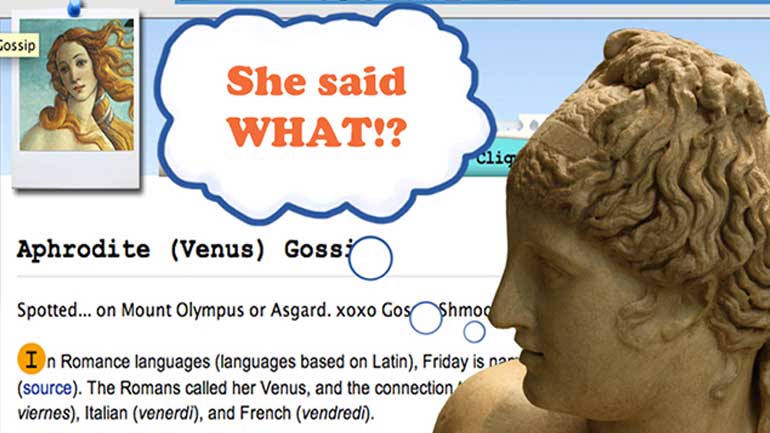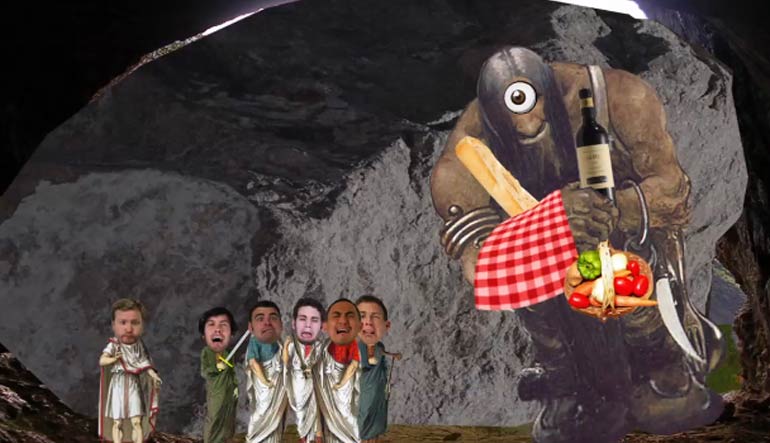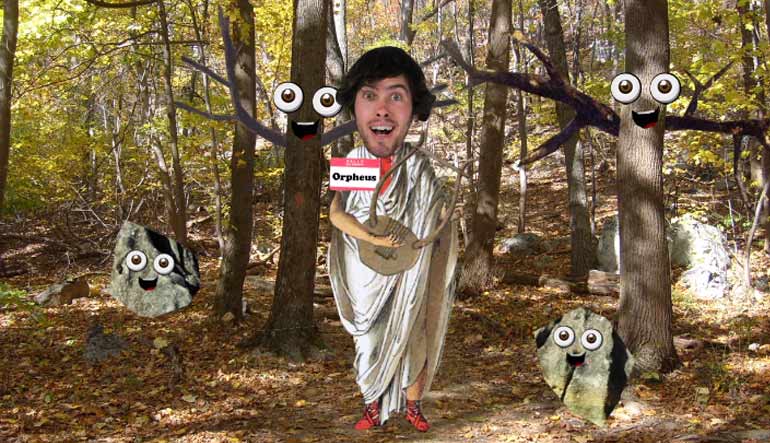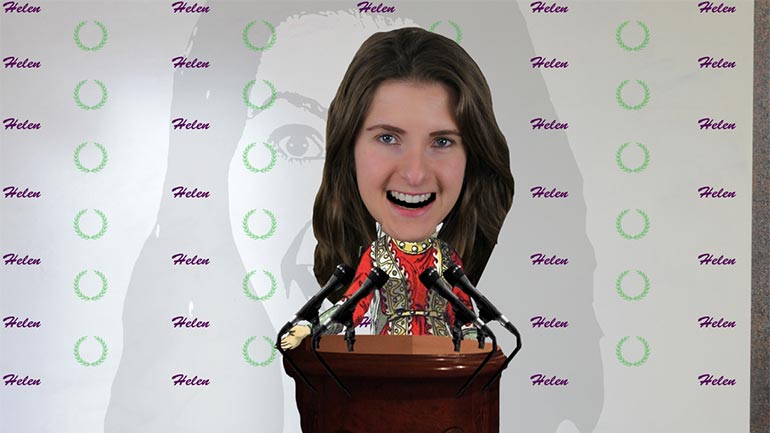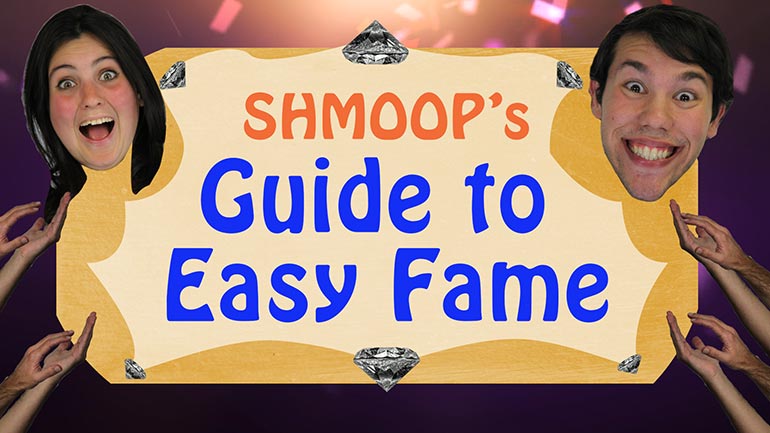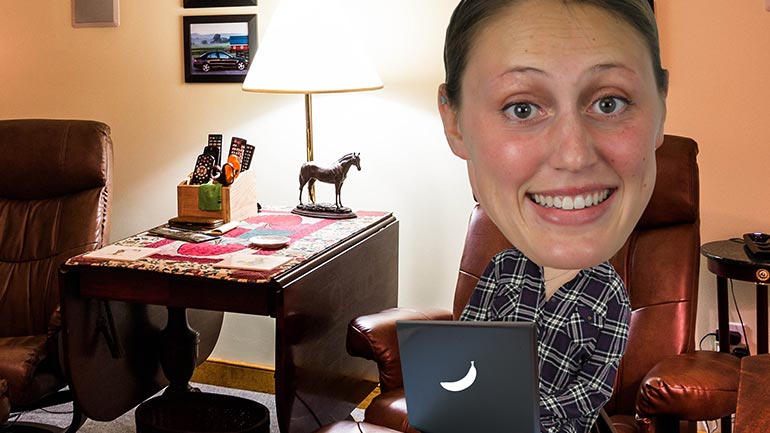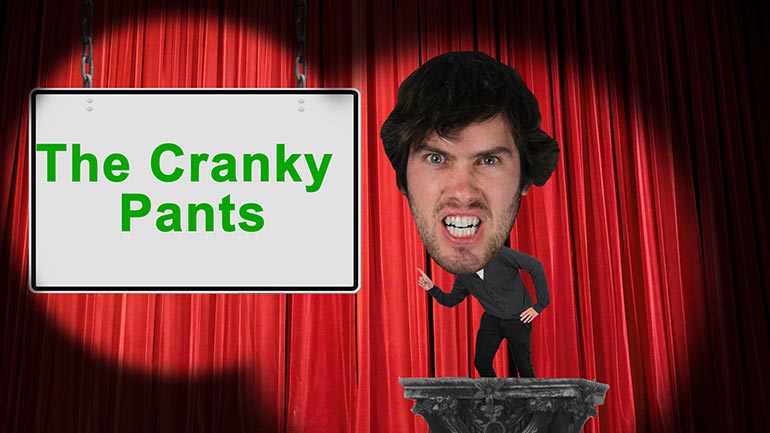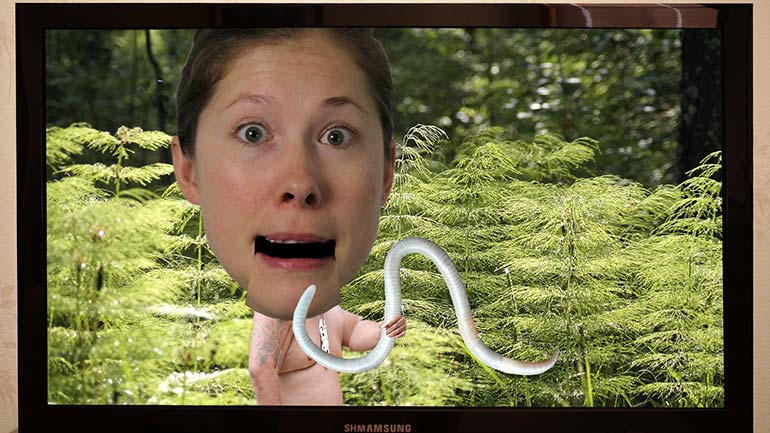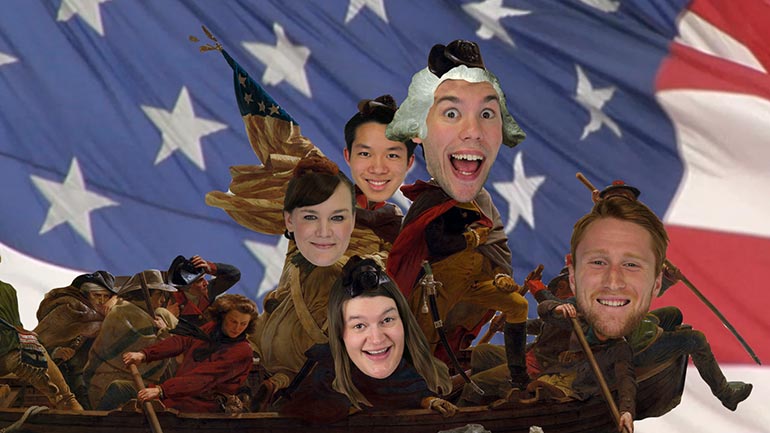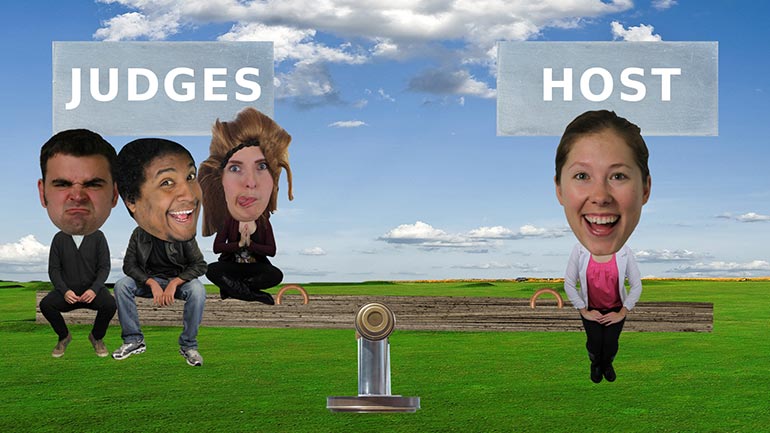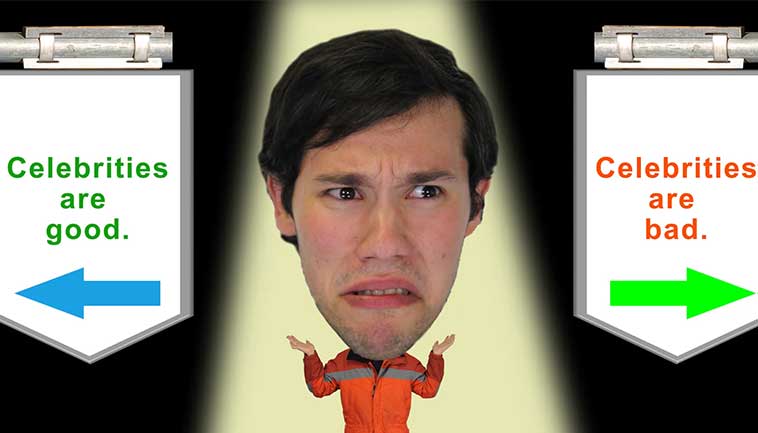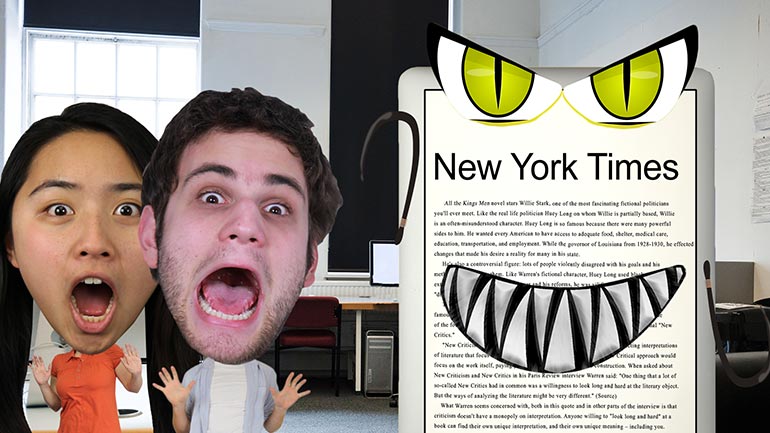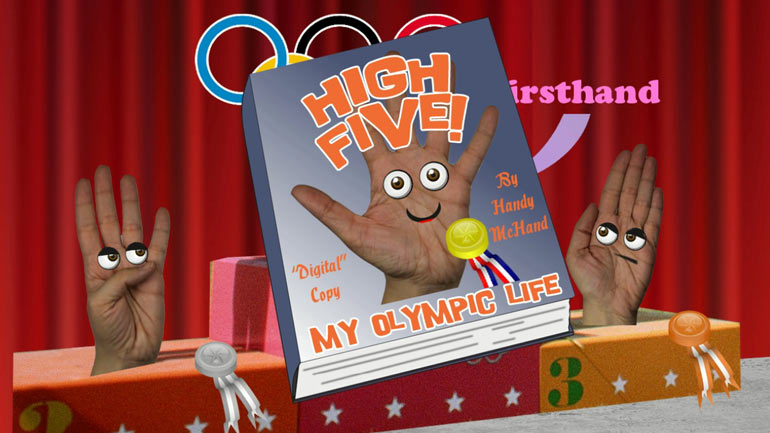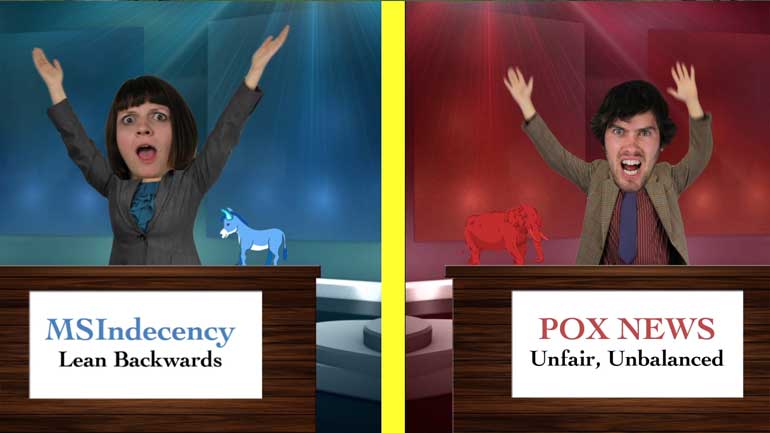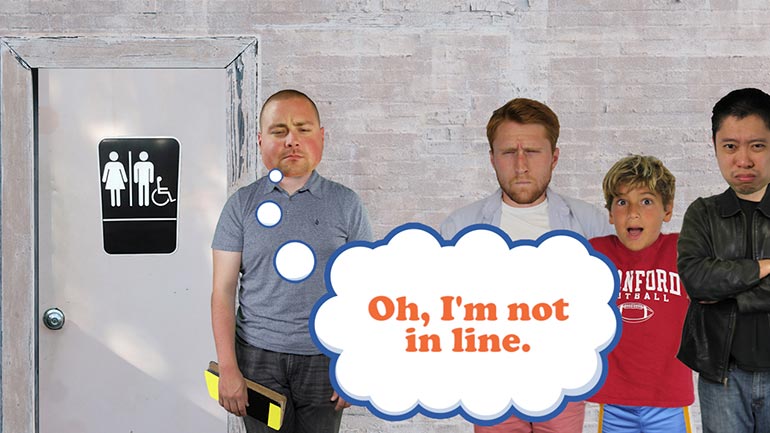ShmoopTube
Where Monty Python meets your 10th grade teacher.
Search Thousands of Shmoop Videos
Humanities Videos 55 videos
The gods and heroes battle it out with monsters in the best of mythology.
Today we aren't looking for the most virtuous person, or most likeable, but rather the most disturbing. Will it be Echo, the nymph who is doomed to...
Web Literacy: Argument 587 Views
Share It!
Transcript
- 00:01
We speak student!
- 00:06
Using Arguments from the Web
- 00:09
[ bird caws ]
- 00:10
How can I support my argument with Internet research?
- 00:14
Basically, in order to make an argument based on Internet research,
Full Transcript
- 00:17
you're gonna just do everything we've already talked about
- 00:19
in the previous lessons.
- 00:20
So this is a nice way to review all those strategies.
- 00:23
The assignment is,
- 00:24
"Here's your topic. Make an argument for or against it
- 00:27
and cite sources."
- 00:29
So what you're gonna do is
- 00:31
first, do that Google search.
- 00:33
Try to see what you can find.
- 00:35
You're gonna then evaluate the credibility of your sources.
- 00:38
If something's completely not usable,
- 00:41
just throw it out.
- 00:42
If you get TMZ or something like that
- 00:44
or a tabloid, you're probably not gonna wanna use it.
- 00:46
Throw it out.
- 00:46
If you get something that's biased,
- 00:48
subjective in one way or another,
- 00:50
you don't have to throw it out yet, that's totally fine.
- 00:52
But you'll get all your sources together.
- 00:55
That's when you're gonna read through your sources.
- 00:56
As you're reading through, you're gonna keep in mind
- 00:58
what's subjective? What's biased? What's not?
- 01:01
And then you're gonna decide
- 01:02
do I agree with this source?
- 01:05
So let's say you end up with three sources.
- 01:07
Read them through.
- 01:08
Do I agree with number one, number two, number three?
- 01:10
Are they all saying the same thing?
- 01:12
Are they saying different things?
- 01:13
And then you're gonna say,
- 01:14
"Okay, you know what?
- 01:15
I disagree with source number one,
- 01:17
agree with source number two,
- 01:19
and disagree with source number three."
- 01:20
Does that mean we throw out one and three?
- 01:23
No. It means you use those to prove your own point.
- 01:27
That's the counterargument.
- 01:29
You say, "Source one says this,
- 01:31
but they're wrong."
- 01:32
So walk us through an example.
- 01:34
Give us three sources
- 01:36
we'd look at -
- 01:37
good, bad, ugly, whatever. Something in between.
- 01:40
And we kind of use that to our advantage.
- 01:44
Okay. So let's say there's an article,
- 01:46
"Do Celebrities Use Their Power for Good?"
- 01:49
That's the topic.
- 01:50
And you're arguing either "yes they do" or "no they don't."
- 01:52
So we have three sources.
- 01:55
First we've gone through all the junk and we've
- 01:58
filtered it out.
- 01:59
We found a tabloid, but we were like,
- 02:01
"Eh, that person's actually still alive.
- 02:02
It said they were dead.
- 02:03
That baby doesn't have eight heads."
- 02:04
So you moved it to the side.
- 02:06
You end up with three sources.
- 02:07
You have an article from People magazine
- 02:10
that you have kept because it actually
- 02:12
cites celebrities giving quotes.
- 02:15
People magazine, in most cases,
- 02:16
is not gonna be something you're gonna cite in a school paper.
- 02:18
But if you're writing an article
- 02:20
about whether or not celebrities do good,
- 02:22
you can actually get quotes
- 02:24
from celebrities from this.
- 02:25
So you're gonna keep in mind that
- 02:27
it's not necessarily the most credible source,
- 02:28
but you're gonna use it.
- 02:29
The next thing you're gonna use is
- 02:31
an article from the New York Times
- 02:33
about Angelina Jolie and Brad Pitt
- 02:36
and what they have done for the world.
- 02:39
And just to kind of highlight that,
- 02:42
you think about what celebrities do that you read about
- 02:45
that you get lots of press for.
- 02:47
You read, I don't know, various celebrities
- 02:52
typically finding large constituencies
- 02:54
and they put themselves at the front
- 02:56
to be the spokesperson for it.
- 02:58
Like Matt Damon trying to be a neutral voice on teaching
- 03:00
out of the teacher's union,
- 03:01
even though his mother is a teacher.
- 03:03
He's trying to present himself as a credible, neutral source.
- 03:06
You have other elements that --
- 03:08
I guess things celebrities do
- 03:12
that nobody writes about
- 03:14
that are actually acts of kindness or good.
- 03:17
So the Angelina and Brad thing is kind of interesting to me
- 03:22
because they practice what they preach.
- 03:24
They actually did it.
- 03:26
And you don't adopt a child for a press release.
- 03:28
A lot more work than that would be worth.
- 03:30
So there it's a different respect.
- 03:33
They actually are doing something they really believe in,
- 03:36
not just to get lots of people to go to buy tickets to go to their next movie.
- 03:40
So the whole notion of doing good and defining things ahead of time...
- 03:44
Is that something we should be doing
- 03:46
before we write the paper?
- 03:48
Meaning do you come into it with an opinion?
- 03:50
That it's research you're ferreting out
- 03:52
so that you look like today's cable news network
- 03:55
and you're supporting either the Republicans or the Democrats?
- 03:57
Or is it more like
- 03:59
you're actually trying to figure out...
- 04:01
Like, is this all a waste of...
- 04:03
Yeah, you're always gonna come in with an opinion.
- 04:04
Almost always you're gonna come in with an opinion.
- 04:06
But allow yourself to be proven wrong.
- 04:09
It's never a bad thing to find out you're wrong.
- 04:13
But you don't necessarily have to
- 04:16
or you shouldn't necessarily come in with an opinion.
- 04:19
But you need to understand
- 04:21
that everyone you are reading
- 04:22
is going to have an opinion.
- 04:24
So if you come into this thinking,
- 04:27
"Oh, celebrities are -- They're all hypocrites,
- 04:30
they're not actually doing good things."
- 04:32
Then you're gonna find --
- 04:34
in whatever you read,
- 04:36
you're gonna find support for your argument.
- 04:38
If you come with a clean slate,
- 04:40
you'll be a little bit more open
- 04:42
to seeing both sides of it.
- 04:43
Academics do this all the time.
- 04:45
They're like, "Oh, you know what would make a really cool paper?
- 04:47
If I wrote about how this specific author
- 04:50
was influenced by this specific author."
- 04:52
And then everything you read
- 04:55
by author number one,
- 04:56
you're like, "Aha, this is very Hemingway-esque, isn't it?"
- 05:00
But if you weren't trying to prove that point,
- 05:02
you might not see it.
- 05:03
So if you do come in with your own opinion,
- 05:06
take a step back and remember that
- 05:08
so that you don't only see that in the sources you've got.
- 05:11
To come back to your point,
- 05:13
the example. So let's say your third source, then,
- 05:15
is a blog entry by a respected journalist.
- 05:21
The feature editor of Time magazine,
- 05:23
for example,
- 05:24
writes a piece about how celebrities are hypocrites
- 05:28
and they say they're trying to save the world
- 05:32
via the environment
- 05:33
and then they take their private jet to get there.
- 05:35
Tons of examples there.
- 05:37
So then you read all these things through and you're like,
- 05:40
"Okay, piece here, piece here.
- 05:42
This is what the celebrities say, this is what this person says."
- 05:44
You have to acknowledge all their biases
- 05:47
and then you're gonna say,
- 05:49
"What do I think?"
- 05:50
And you can think either way.
- 05:51
There is no -- This is an argument; it's an opinion.
- 05:54
You have an opinion. You can say,
- 05:55
"Yes, celebrities are hypocrites.
- 05:57
They're not doing good for the world."
- 05:58
Or you can say,
- 05:59
"No, man, like have you seen?
- 06:00
They do so much good for the world.
- 06:02
Celebrities do use their power for good."
- 06:03
Number one thing - just pick a side.
- 06:05
If you're wishy-washy about it,
- 06:07
it's not good.
- 06:08
Your teacher isn't trying to see if you can
- 06:12
get all of the nuances of the...
- 06:14
They're trying to see if you can write an argument paper.
- 06:16
So pick an argument and stick with it.
- 06:19
So then what you're gonna do
- 06:20
is use all three of these sources.
- 06:23
The ones that you agree with --
- 06:24
Let's say I've decided that celebrities are hypocrites.
- 06:27
That blog entry that says that,
- 06:29
I'm gonna use that as my support
- 06:31
and I'm gonna say,
- 06:32
"As this respected journalist says,
- 06:34
X, Y, and Z. Celebrities are hypocrites.
- 06:37
They take their private jets.
- 06:38
Here's an example they give."
- 06:39
But then I'm gonna use the other sources
- 06:42
as counterexamples.
- 06:44
So I'm gonna say,
- 06:45
"Yes, as the author of this New York Times article says,
- 06:48
Brad and Angelina have given X amount of money
- 06:50
and they have flown to Africa
- 06:52
and all over the world and adopted children.
- 06:54
But that's an edge case.
- 06:56
That's one example.
- 06:58
That journalist only talked about Angelina and Brad.
- 07:00
My source number three gave 15 examples of the opposite."
- 07:04
So basically what you're gonna then do
- 07:06
is use your sources,
- 07:08
whether you agree with them or not,
- 07:09
to support your own argument.
- 07:11
And then we get into the whole
- 07:12
always acknowledge the counterargument,
- 07:14
five paragraph essay and all that.
- 07:16
That's a different course.
- 07:17
But that's how you're gonna use
- 07:19
your Internet sources
- 07:21
to make your argument.
- 07:23
You're gonna find your sources,
- 07:25
evaluate them, read them,
- 07:27
decide if you agree or disagree,
- 07:29
and then use them as support.
- 07:33
[ pen writing ]
- 07:36
How can you use Internet research to make a good argument?
- 07:40
How important are sources?
- 07:43
Am I allowed to be subjective?
- 07:50
I have no idea what you want me to say here. [ chuckles ]
Related Videos
What's the difference between a real estate agent and a real estate broker? Is the latter just, uh... out of cash? Quite the opposite, in fact. Jum...
So... what's a TSA worker, and what do they do? Oh, we thought maybe you knew. Okay, okay... so TSA (or Transportation Security Administration) wor...
